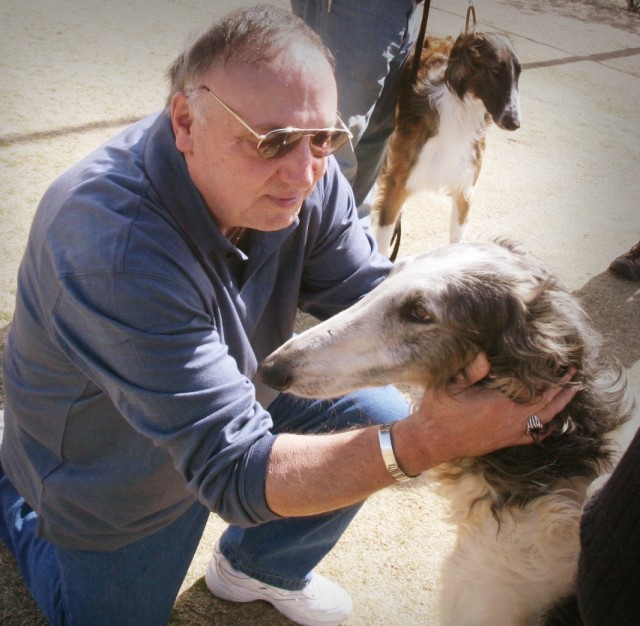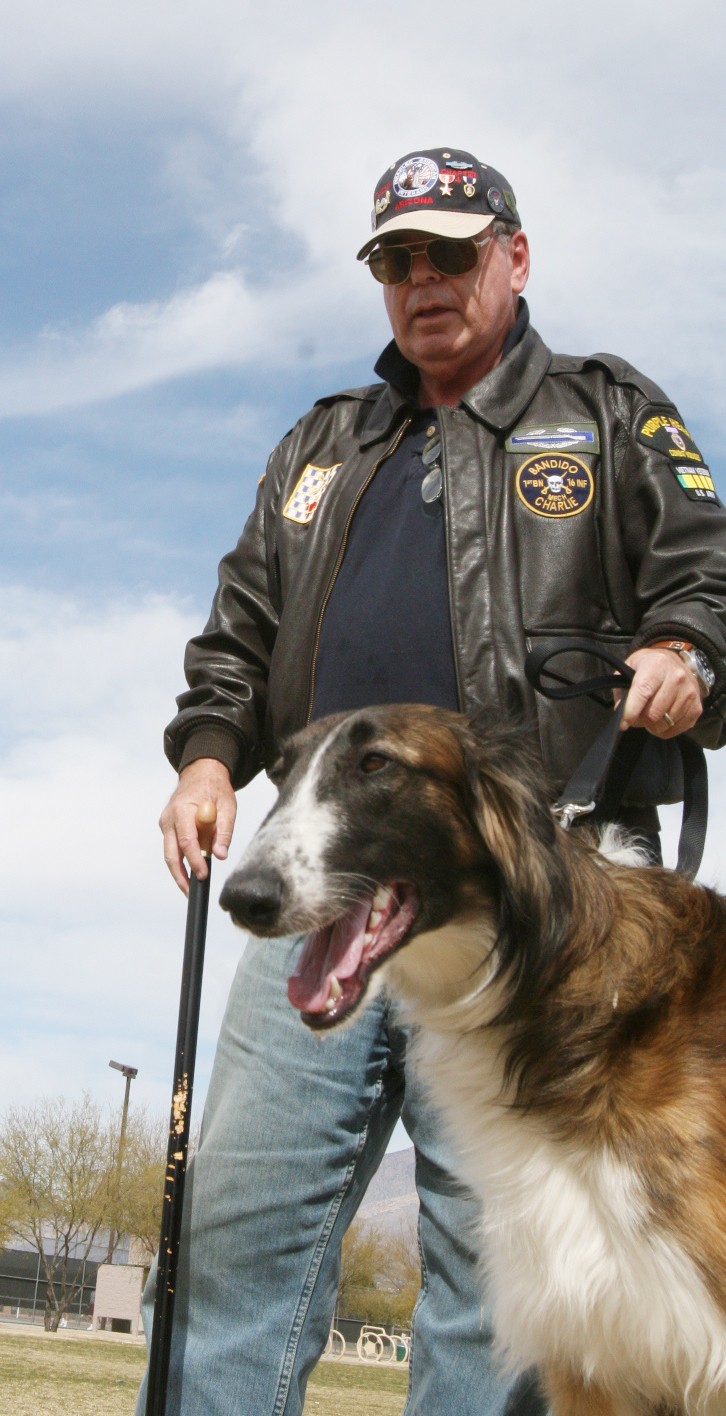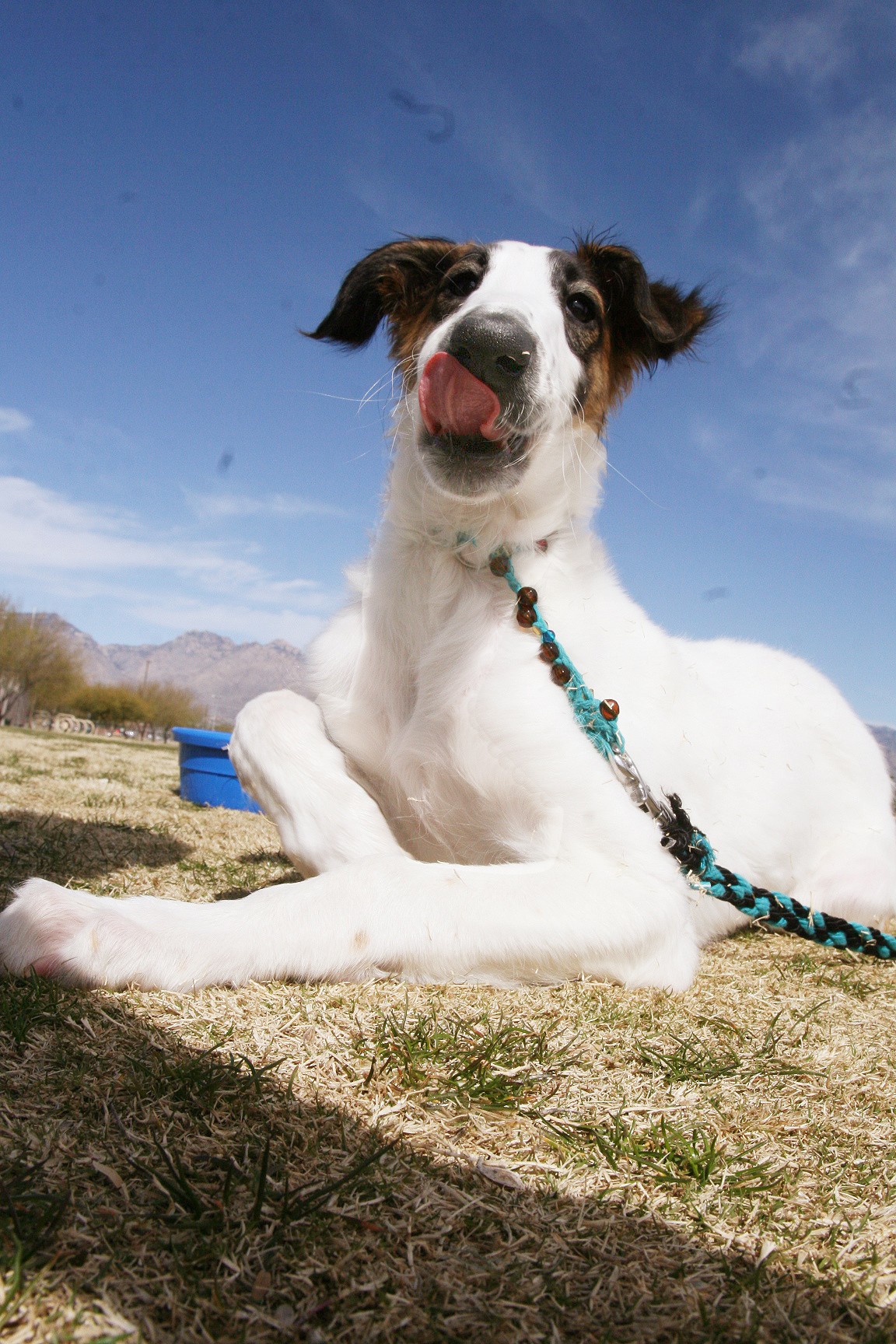FORT HUACHUCA, Ariz. -- For over 40 years Ken Costich, a former Army colonel, has dealt with post-traumatic stress disorder symptoms.
Lucien Mason, a former lance corporal in the Marine Corps has also coped with PTSD since he returned from Vietnam, more than 35 years ago.
Both men have endured medical treatment and sought psychological assistance from professionals, and both men are turning to service dogs as a last resort.
According to the National Institute of Mental Health, PTSD is an "anxiety disorder that can develop after exposure to a terrifying event or ordeal in which physical harm occurred or was threatened."
"With all the great care Veterans Affairs has given me, they have not been able to find a medication for anger, depression, anxiety or the nightmares that worked for me," Costich explained.
"Medication works 50 percent of the time. Talk therapy, alone, works 30 percent of the time, and dogs work 84.5 percent of the time," said Alicia Miller, Army veteran and cofounder of Operation Wolfhound. "The dogs are proven effective. It's a much better deal for the veteran because they don't have to worry about the side effects of medication."
Operation Wolfhound began about two years ago when Miller's daughter, Rhiannon, suggested they donate two of their Borzoi puppies to people in need of a service dog. Miller, who also experiences symptoms associated with PTSD, said the dogs were well received and proved to be helpful to their owners. To date, Operation Wolfhound has donated or pledged seven dogs to veterans with PTSD.
Borzoi pups were chosen because of their ability to think independently and be protective without being aggressive. They have the potential to live up to 15 years, and are quiet large dogs that are able to physically support a person.
Operation Wolfhound puts strict parameters on service dog candidates. For instance, they will not accept a dog that is more than 4 years-old.
Miller also said all dogs must come from parents that were screened for genetic diseases and temperament, usually back four generations. The reason is that a person with PTSD, who is emotionally vulnerable, would not deal well with an early death of their service animal.
The dog and training are provided to the veteran, at no cost. Miller notes that this is important because an adult service dog candidate with basic training would cost the veteran about $5,000 and the training would add up to $40,000.
A dog receives at least 50 hours of training before going to live with their veteran, which is required by the International Association of Assistance Dog Partners. IAADP is a non-profit, organization that represents people partnered with guide, hearing and service dogs.
During this training, the dog is evaluated for temperament, trained to be safe with all other animals and small children, and introduced to many public situations.
"You never know what the veteran's situation is going to be so you train for every situation," Miller explained.
After a dog receives the minimum training and the trainer feels the canine is ready to serve their veteran, they will hand the Borzoi over to the veteran, and begin weekly hour-long training sessions. The veteran must also work with their dog daily.
"We train the veteran to train the dog the rest of the way, for their specific needs," Miller said, explaining there are two reasons for this method.
"When the dog's lifespan is over the veteran already has the tools to train another dog, and it gives the veteran more control over their condition, meaning, when you're training a dog to take care of your problems you're directly affecting your situation and that makes a big difference."
During their weekly sessions, veterans learn to be in control of the dog by using positive reinforcement.
"This type of training takes longer but it's a bond of complete trust and love when you're done," Miller explained. According to Miller, a prime candidate for a service dog is a veteran of any war or military armed services who has anxiety disorder, PTSD, and or psychological issues that need support.
"There are two types of dogs," she noted, "an emotional support, which can be any breed of dog, and a service, which are used to reduce the symptoms of PTSD and soothe anxiety."
She said the Borzoi breed is not very obedient, but they are empathic. They can be trained to serve various functions, such as reminding their owner to take medications, or calming them down while driving in vehicular traffic.
"They will try to calm their veteran down in an upsetting situation, or will get their owner out of that situation."
Costich, who has been accompanied by Bandit for a month, said it took about three days for the pair to form a bond.
"This dog [did] more for me in three weeks than any medication any doctor has every prescribed," Costich explained. "He senses when I'm having nightmares, and will wake me up [by nuzzling] me."
Bandit has also been able to sense panic attacks. He warns Costich by jumping up, giving him a "hug" and nuzzling him until he gets through it. He has also been able to use Bandit as a crutch for balance.
He says Bandit has become a huge part of him.
"I kind of feel guilty dragging him around with me all over the place but he doesn't seem to mind. He's like my best friend," Costich explained, noting, his wife calls him 'my other wife.'
Mason, who met his service dog, Corona, for the first time Feb. 20, said he hopes the dog will help with nightmares associated with PTSD.
"The dog will be able to either lick [my] face or turn the light on to wake [me] up," he explained. And hopes Corona can assist with his road rage.
Since he has high blood pressure, the dog will be trained to sense when he is getting stressed out and will put his head on Mason's lap to be petted, which will aid in calming him down.
Mason has high aspirations for Corona and hopes he will ultimately help reduce the amount of medication he takes. Miller believes Operation Wolfhound has proved to be successful but they constantly face challenges associated with transporting Borzoi dogs from pledges to trainers and veterans.
"We rely on donated rides and do not take [monetary] donations," she said, noting that might change but for right now they are able to keep Operation Wolfhound a success through volunteers and dogs donated by Borzoi Club of America members. Over 100 volunteers, through the United States and Canada, contribute their time to Operation Wolfhound.
She said they also rely heavily on word of mouth exposure, and have been published in some military newsletters.
For more information about the program visit their Web site, <a href="http://www.lundr.com/" target=Aca,!A?_blank">http://www.lundr.com/</a>, or search for "Operation Wolfhound" on Facebook.












Social Sharing